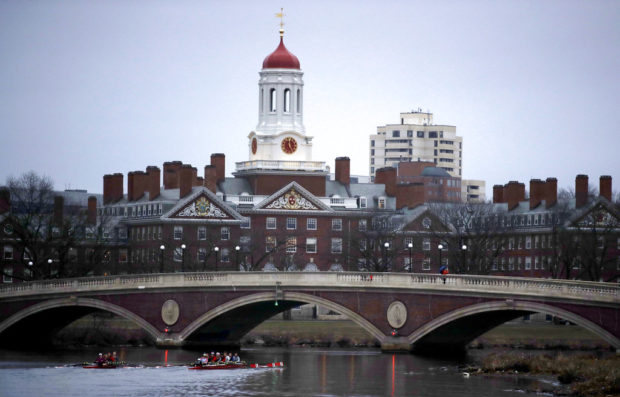Harvard on trial over alleged discrimination against Asians

In this March 7, 2017 file photo, rowers paddle down the Charles River past the campus of Harvard University in Cambridge, Massachusettes. A lawsuit alleging racial discrimination against Asian American applicants in Harvard’s admissions process is heading to trial in Boston’s federal court on Monday, Oct. 15, 2018. Harvard denies any discrimination, saying it considers race as one of many factors when considering applicants. AP
NEW YORK, United States – Harvard University went on trial Monday over an opaque admissions selection process that critics say discriminates against Asian students.
A lawsuit has challenged the use of race as a factor in Harvard admissions — a decades-old push to boost minority enrollments at America’s oldest and perhaps most prestigious university.
Federal Judge Allison Dale Burroughs heard opening arguments in the non-jury civil trial in Boston expected to last three weeks.
Harvard denies discriminating against Asians but defends its use of broader selection criteria than academic excellence, such as personality, to form a diverse student body.
The university also notes that the proportion of students of Asian origin has increased substantially since 2010, and today account for 23 percent of the 2,000 students admitted to the freshman class out of 40,000 applicants.
Article continues after this advertisementThere are around 15 percent blacks and 12 percent Hispanics.
Article continues after this advertisementPitted against the revered academic institution is Students for Fair Admissions, a group led by conservative white activist Edward Blum, who previously attacked the affirmative action policies at the University of Texas.
The US Supreme Court ruled against him in 2016, upholding the university’s admissions policy.
In opening arguments, the group’s lawyer Adam Mortara claimed that Harvard had used personality criteria to suppress Asian admissions in favor of black, Hispanic and white applicants.
Harvard “let the wolf of racial bias in through the front door,” The Boston Globe quoted him as saying.
University lawyer Bill Lee argued that “Harvard cannot achieve its educational goals without considering race,” insisting that race is never a negative in admissions.
Aware of the negative publicity the case could bring to his institution, Harvard’s recently appointed president Larry Becow issued a letter to staff and students before the trial opened recalling the college’s duty to incorporate racial diversity into the campus.
“Harvard would be a dull place — and not likely achieve the educational aspirations we have for our students — if we shared the same backgrounds, interests, experiences and expectations for ourselves,” he wrote.
President Donald Trump’s administration has backed Blum’s suit, asserting that Harvard engages in “racial balancing” in its admissions process at the expense of students of Asian origin.
In his letter, Becow noted that the Supreme Court had in the past held up Harvard’s admissions process as “an examplar” in how to achieve a diverse student body by considering race as one of several factors.
Analysts expect the ultra-sensitive case to once again come before the Supreme Court, where a conservative majority has recently been solidified with the addition of Trump nominee Brett Kavanaugh. /cbb